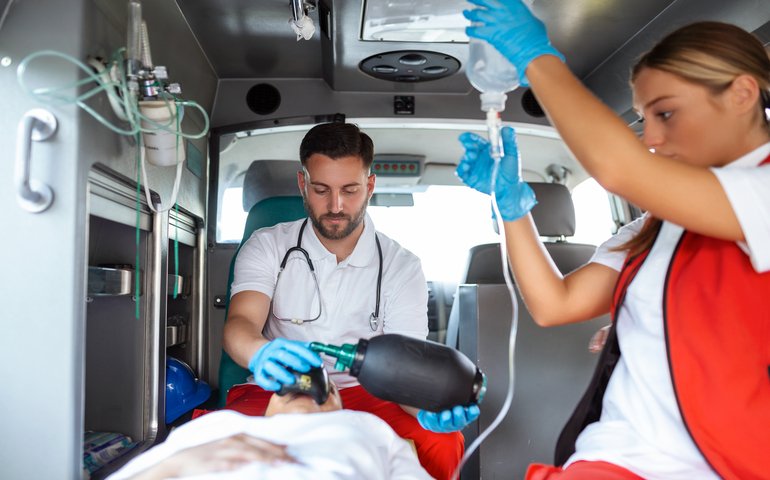The Paramedicine Level 3 Advanced Diploma is a dynamic course that equips aspiring paramedics with essential skills for high-quality emergency care. Topics include Introduction to Paramedicine, Anatomy and Physiology, Medical Emergencies, Trauma Management, Pharmacology, Advanced Life Support, Special Populations, Disaster Management, Leadership, and Clinical Practicum. Graduates become competent and compassionate paramedics, ready to save lives and support the community. Expert guidance, modern resources, and hands-on experience ensure a well-rounded education.
Overview
Paramedicine Level 3 Advanced Diploma is a comprehensive and dynamic course designed to equip aspiring paramedics with the knowledge and skills needed to provide high-quality emergency medical care. This course encompasses a wide range of topics, starting with an Introduction to Paramedicine, where students gain insight into the fundamental principles of emergency medical services. Anatomy and Physiology are explored in depth, allowing students to understand the intricacies of the human body and how it functions during emergencies. Medical Emergencies and Trauma Management lectures provide a solid foundation in identifying, assessing, and effectively responding to various medical crises, both acute and chronic. Pharmacology for Paramedics delves into the critical aspect of medications used in emergency care, ensuring students are proficient in administering and managing drug therapies. Advanced Life Support is covered extensively, enabling students to handle complex life-threatening situations confidently. Special Populations introduces students to the unique challenges involved in treating individuals with specific medical needs, such as pediatric and geriatric patients. Disaster and Mass Casualty Management equip students to tackle large-scale emergencies efficiently and collaboratively. Professional Development and Leadership focus on nurturing leadership skills, fostering teamwork, and promoting continuous growth within the paramedicine field. The course concludes with Clinical Practicum, offering invaluable hands-on experience in real-world settings, consolidating theoretical knowledge with practical application. Throughout this course, students will be guided by experienced instructors, and they will have access to cutting-edge resources and facilities. Upon completion, graduates will emerge as competent and compassionate paramedics, ready to make a profound difference in saving lives and ensuring the well-being of the community.What Will You Learn?
- Fundamental principles and concepts of Paramedicine
- Anatomy and Physiology of the human body
- Effective management of various Medical Emergencies
- Techniques for Trauma Management and assessment
- Pharmacology specific to Paramedics and medication administration
- Advanced Life Support procedures and protocols
- Special considerations and care for diverse populations
- Disaster and Mass Casualty Management strategies
- Professional development and leadership skills for paramedics
- Practical application through Clinical Practicum experience.
Who Should Take The Course?
- Aspiring paramedics seeking a comprehensive education in emergency medical care
- Healthcare professionals looking to specialize in pre-hospital emergency medicine
- Current paramedics aiming to advance their knowledge and skills to an advanced level
- Individuals interested in joining the emergency medical services field and making a positive impact on the community
- Those who want to be well-prepared to handle medical emergencies, disasters, and mass casualty situations
- Individuals seeking opportunities for professional growth and leadership within the paramedicine field.
Requirements
- A high school diploma or equivalent qualification.
- Basic proficiency in English language (reading, writing, and communication).
- A strong interest and commitment to emergency medical care.
- Good physical fitness and the ability to meet the demands of the paramedic profession.
- Certain courses or institutions may have specific age requirements or prerequisites, so be sure to check with the respective educational provider for any additional requirements.
Course Curriculum
-
- Introduction to the paramedic profession 00:06:00
- Scope of practice and legal considerations 00:05:00
- Ethical and professional responsibilities 00:06:00
- Communication and teamwork skills 00:04:00
-
- Human anatomy and physiological systems 00:04:00
- Cardiovascular system 00:05:00
- Respiratory system 00:06:00
- Nervous system 00:06:00
- Musculoskeletal system 00:06:00
- Assessment and management of common medical conditions 00:06:00
- Cardiac emergencies 00:05:00
- Respiratory emergencies 00:05:00
- Neurological emergencies 00:07:00
- Endocrine emergencies 00:06:00
- Principles of pharmacology and drug administration 00:07:00
- Medications used in emergency situations 00:06:00
- Dosages, routes of administration, and side effects 00:05:00
- Patient assessment and medication selection 00:06:00
- Assessment and management of special patient populations 00:06:00
- Geriatric emergencies 00:06:00
- Pediatric emergencies 00:05:00
- Obstetric emergencies 00:06:00
- Behavioral and mental health emergencies 00:06:00
- Continuing education and professional growth 00:06:00
- Quality improvement and patient safety 00:05:00
- Leadership and management skills 00:05:00
- Professionalism and self-care 00:06:00
- Ethical dilemmas in paramedicine 00:05:00
- Exam of Paramedicine Level 3 Advanced Diploma 00:50:00
New Courses
Blogs
Jul'23
ADHD Training for Teachers: Empowering Educators to Support Students with Attention Challenges
Relationships may be severely harmed by narcissistic behaviours, leaving emotional scars and...
Jul'23
Narcissistic Behaviour and Relationships: Understanding the Impact and Finding Healing
Relationships may be severely harmed by narcissistic behaviours, leaving emotional...
Jul'23
Childhood Trauma in Adults
What Is Childhood Trauma? Childhood trauma refers to distressing or...
Jul'23
Creating A Social Media Strategy
Set Clear Objectives:The first step in developing a successful social media...
Jul'23
Neuro-Linguistic Programming Techniques
Neuro-Linguistic Programming (NLP) is a fascinating and widely acclaimed approach...
Jul'23
Acceptance and Commitment Therapy in the UK
What is acceptance and commitment therapy? Acceptance and Commitment Therapy...





